When Israel gave me permission to enter Gaza, a little strip of land integral to Palestine but completely cut off, I jumped for joy and called my friends to gloat as if I’d won a lottery. A few minutes later, I heard myself sigh involuntarily as I admitted that I really didn’t want to go. Who would want to go to a place that oozes hopelessness, that embodies the failure of the world to deliver on even their most basic humanitarian obligations? Last year after a visit to Gaza, also for work, I spent two weeks in bed trying to recover.
But my recent visit was fantastic thanks in great part to the brilliance of Aid Watch Palestine’s Haneen Rizik Elsammak, one of the most energetic, decent, generous and inspirational people I have the privilege to know. From north to south and east to west, she introduced me to people who opened their homes and shared their very, very difficult stories. In between I reconnected with true friends (you know who you are) who continually amaze me with how much they offer to the world and how many obstacles they are forced to traverse in order to do so.
I left Gaza sad but refocused. I still believe Gaza exemplifies #HumanitarianBetrayal, but it is also bursting with #TransformationalOpportunity.
* * * *
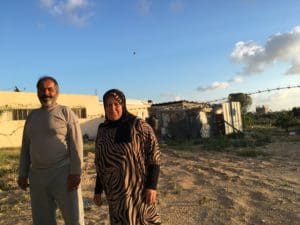
Latefa and Nezam Alaqaad in Khan Younis lost their home in the 2014 Israeli attack and now, nearly two years later, they still live in a makeshift aluminum room on the site of the four-story building they used to live in.
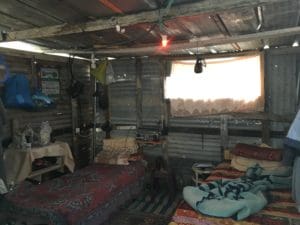
Inside, the temperature was comfortable in the early spring, but it becomes desperately cold and wet in winter and unbearably hot in the summer.
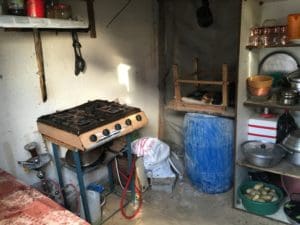
The tiny kitchen is outside as is the tiny bathroom.
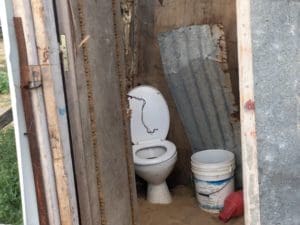
Much of the basic infrastructure is damaged, so utilities are rigged, unreliable and dangerous. There is no privacy, no security, no community, and no hope for any solution in the near-term.
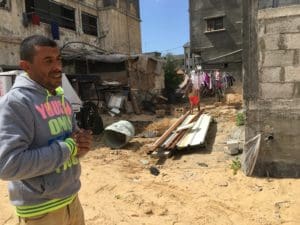
Not far away in Khuzaa, I visited a family of seven that I wrote about in Huffington Post 8 months ago. Before the 2014 Israeli attack, Marwan Abu Jammous lived with his brothers in a 4-story building that used to stand in the place where laundry now dries. After his house was destroyed, Marwan’s family was given temporary shelter.
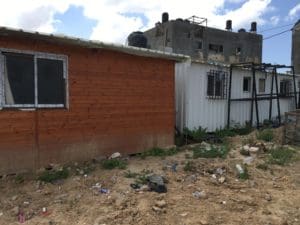 The aluminum caravan was so hot last summer, they slept outside. When the municipality wanted the land, Marwan moved his caravan near to his demolished home; that made the caravan even more unlivable. A donor provided a new, wooden caravan, but as the photo shows, it floods. There is no clarity if, when or how this family will ever get a new house.
The aluminum caravan was so hot last summer, they slept outside. When the municipality wanted the land, Marwan moved his caravan near to his demolished home; that made the caravan even more unlivable. A donor provided a new, wooden caravan, but as the photo shows, it floods. There is no clarity if, when or how this family will ever get a new house.
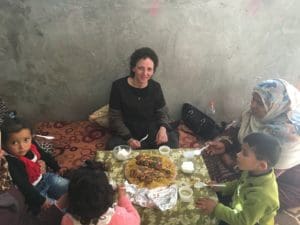
But despite the glum situation, the family welcomed me, fed me, and showed me a great time.
To me, the caravans exemplify the catastrophic failure of the humanitarian system, not just in Gaza, but in the world. Humanitarian actors are supposed to respond to emergencies, and therefore they provide short-term relief, not long-term solutions. But in Gaza, which is locked in a long-term, man-made disaster, short-term relief (like caravans that are intended for habitation only up to six months) are ridiculous — unless paired with intensive, serious and effective political advocacy to end the root causes of the humanitarian crisis. While the international community whines “we’re doing the best we can,” kids in caravans in Gaza are dealing with the physical, emotional, economic, academic and spiritual effects of three major Israeli attacks in 8 short years.
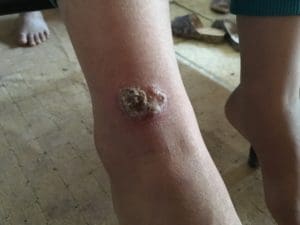
One little girl in Beit Hanoun showed me her skin condition, which her mom said is rampant in the caravans. Can we not prevent this kind of needless human suffering?
There was some weird stuff along the way:
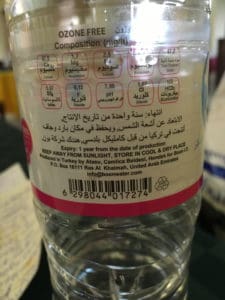
Water made in Turkey, by a company in the United Arab Emirates, imported to Gaza, with taxes paid to Israel. Wow, a lot of people are making money from Israel’s preventing Palestinians from accessing their own water.
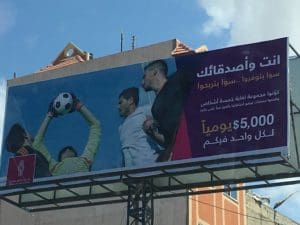
And this towering billboard advertising Bank of Palestine’s daily prize of $5,000. It’s normal in cosmopolitan Ramallah, but to see this in Gaza where the prize might well feed a poor family for something like 8 years, it was, well, weird.
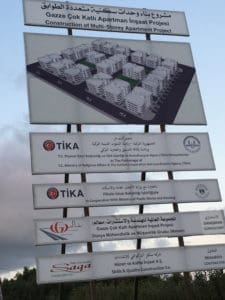
Also, all along the highways are notices that donors are building new housing, but many of these signs have been up for a long time, in front of empty lots where there is no visible beginnings of any work, and no one in the community has heard about the project or believes that it will ever come to fruition. It’s like Gaza exists in two “realities,” the deteriorating and frustrating real one and the fantasy one that is “advertised” by international organizations as being in the process of development.
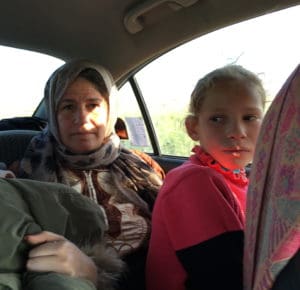
In Beit Hanoun, we drove towards Israel, but it’s hard to see where the buffer zone starts (an Israeli demarcated no-go zone in which soldiers routinely fire from watchtowers at farmers or livestock), so we felt a bit nervous. Haneen, ever efficient, leaned out of the driver’s side window and invited this exceptionally nice woman and her shy granddaughter to ride with us so that we wouldn’t stray too far.
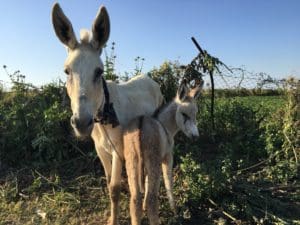 On the short drive, she showed us the rubble of her house, and her brother’s, and then, casually, she pointed out this donkey. “This donkey ran across the buffer zone to Israel and escaped the bombing that killed its owner. After the ceasefire, she came back, but the family who owned her never will.”
On the short drive, she showed us the rubble of her house, and her brother’s, and then, casually, she pointed out this donkey. “This donkey ran across the buffer zone to Israel and escaped the bombing that killed its owner. After the ceasefire, she came back, but the family who owned her never will.”
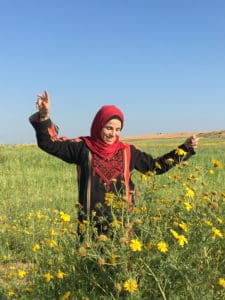
We relieved the stress of the day, which happened to be Palestinian Land Day, by taking pictures of ourselves and one another among the beautiful wild daisies. We must have taken hundreds of pictures. We were a raucous group of women! This picture of Haneen shows what a good time we had.
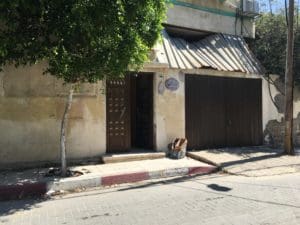
Back in Gaza city, Haneen took me to an inspiring voluntary initiative where, tucked away in a nondescript location, a group of women collect used clothes and furniture and make them available for free to other women in difficult circumstances.
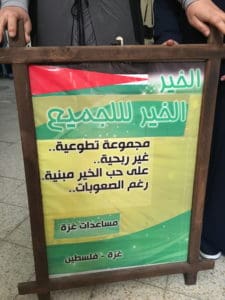 While I visited, various items were donated and various women came to shop for things they needed. The whole operation oozes with respect and gratitude and mutual help.
While I visited, various items were donated and various women came to shop for things they needed. The whole operation oozes with respect and gratitude and mutual help.
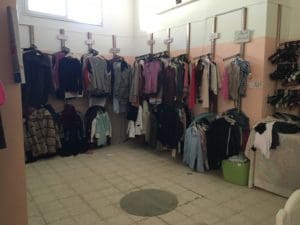 No sense of desperation or hopelessness there — Gazan society is doing what they can to help themselves. It was a good way to end my visit. But then, driving towards Erez Checkpoint on my way home, I began to feel a bit desperate. Had I used my precious time in Gaza fully? I started to snap photos indiscriminately to try to hold on to Gaza, to my gratitude for getting to visit this special place.
No sense of desperation or hopelessness there — Gazan society is doing what they can to help themselves. It was a good way to end my visit. But then, driving towards Erez Checkpoint on my way home, I began to feel a bit desperate. Had I used my precious time in Gaza fully? I started to snap photos indiscriminately to try to hold on to Gaza, to my gratitude for getting to visit this special place.
Reviewing my pictures at home, I laughed out loud to see I had taken a short video of a generator, an almost identical clip to one I shared in a 4-minute video I made about my April 2013 visit to Gaza — three years ago! Generators run Gaza, which has electricity for only 4 or 6 hours at a time. Like caravans, generators are tangible evidence of the way we are dealing with the #InhumanIllegalIsraeliBlockade — with expensive, environmentally damaging, inadequate, short-term responses to pacify 1.8 million Palestinians who are locked in the Gaza Strip.
Shame on everyone who doesn’t speak out for accountability.
Dear Nora, Thanks for sharing the reality of Gaza that the world doesn’t see, especially now that the war is considered “over,” though the devastation continues.
Yes, Paula, the devastation continues and, in fact, gets worse. Yesterday a friend called from Gaza desperate for any opportunity to earn money to provide for his family. What can I do or say when the system is designed to prevent people from living even a minimally decent life? Israel is doing this to Palestinians on purpose! The US and Europeans are supporting Israel! A lot of people are profiting while Palestinians suffer.
Thanks a lot Nora. But you saw part of Gaza. Next time you will see new things.
I can’t wait!
Thank you so much for sharing your essay with us. During the time of the attacks in 2014, your Skype interviews with your friends in the region hit me hard. Now, we could see some photos of Gaza on website which tell us they are still living in difficult situation. Your report let us know how those people survive after the horrible attacks and the years of siege.
All I can do now is to send love to them. You and the people in Palestine are always in my prayer.
This really means a lot to me, Kiriko. I am glad to know that my efforts to bring visibility to Gaza matter.
مقال أكثر من رائع نورا بوركت يداكي
Shukran, Fathi. Kaan kteer mumtaaz ashufak!
Thank you so much for this, Nora, and for the work that you, Haneen and everyone at Aid Watch Palestine does. This kind of accountability is vital to exposing the racket that international ‘aid’ so often is. You’re an inspiration to us all 🙂
I’m honored, Sarah.
Fantastic article/essay.
It is amazing to see your journey to Gaza, but it is even more amazing to see that these people, who’s lives have been tarnished, are still capable of sincere and proper kindness. They somehow are still capable of smiling in such terrible times.
I wanted to ask, as a South African, how could I lessening the suffering and plight of these people?
Hi Muhammed, sorry I couldn’t respond to your comment sooner. Actually, the answer is simple and also complex. The most important thing everyone can do, and should do, I think, is to pressure your own government to play a constructive role in ending the occupation and finding a just solution to the conflict once and for all. Ultimately we need to isolate Israel and the US in order to pressure for change, so every country matters. In addition, any kind of solidarity is always welcome. People can do that in so many ways. Feel free to let me know what you love to do and what you want to do and maybe I can help connect you to people who could benefit. You can reach me on nora@noralestermurad.com.
Thank you, Nora. I learn so much from you, and from the perseverance of the people who inspire you in Gaza.
I learn from them too! I’m glad I can pass some of it along.
Great essay ! So appreciated for giving the whole world to have a look from your window of Gaza . Thanks my friend for all your awesome efforts ? . By the way you were so close to my home when you visit the association of women Al khair la jamee’ . wish to have another opportunity to meet you . My warm greetings to you and Haneen ?
Next time, we’ll meet for sure!
Dear Nora,
thank you so much for this wonderful personal report. And thank you for your commitment.
Best wishes
Karin
Thanks for reading and sharing!
Great essay. Thanks nora.
Thanks to you for all you’ve taught me about Gaza.